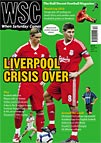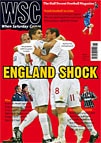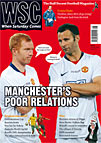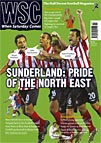 Dear WSC
Dear WSC
I read with interest Paul Joyce’s article concerning the rebranding of SSV Markranstadt as RB Leipzig in WSC 273. Only this summer it was rumoured that my club Southampton would be saved from extinction by becoming co-opted into the Red Bull sporting portfolio. While the team colours, fitting snugly with the brand, would not need to change the adding of the Red Bull moniker seemed a step too far. Surely something would be lost in fusing a global brand, with all its focus-grouped values and marketing spin, to a football club; an act of historic vandalism similar to replacing stained glass windows in a church with double glazing while nailing a satellite dish to the spire. The internet debate suggested, however, that many Saints supporters were happy to trade naming rights in exchange for the club’s survival. The same supporters had several years previously reacted angrily against a corporate branding of St Mary’s Stadium as simply the “Friends Provident Stadium” with the ensuing negative publicity resulting in a U-turn with the addition of St Mary’s to the title. Corporate patronage is not as new as we would like to imagine. The P in PSV Eindhoven stands for Philips, as in the Dutch electrical giants, with the club’s home games at the Philips Stadion. Indeed, many clubs have benefited from long-term relationships with business which may be far preferable to other ownership and financing options; a quick glance around the leagues reveals several fates far worse than “Red Bull Saints”. Football may be just a game to some but following our team is about being part of a community, feeling a connection with the friends and strangers stood next to us at the ground. It is a thread linking us to people looking out for the score on a TV screen or in a newspaper on the other side of the world. Brands by their nature seek to harness and transform these feelings to translate them into profit, in the process sullying the very spirit of our club. Barcelona’s motto is “more than a club”. Every clubs motto should be “more than a brand”.
Neil Cotton, Southampton
Search: 'laws'
Stories
 From Port Vale to Port of Spain, and now Los Angeles. Andy Fraser charts the progress of a Caribbean cult hero born in Stafford
From Port Vale to Port of Spain, and now Los Angeles. Andy Fraser charts the progress of a Caribbean cult hero born in Stafford
When Chris Birchall signed for LA Galaxy this summer, it marked a new twist in a once-promising career that seemed stalled in the lower leagues. While Birchall had all but disappeared in the UK following his unlikely World Cup heroics for Trinidad & Tobago three years ago, across the Atlantic his performances for his adopted nation lingered longer in the memory. On signing the Stafford-born midfielder, Galaxy’s coach Bruce Arena spoke of his longstanding admiration for the player Trinidadians hail as a national hero and affectionately refer to as “Me Mum”.
 The experiment of using additional officials in the Europa League does not appear to be working
The experiment of using additional officials in the Europa League does not appear to be working
This season’s Europa League matches have generated more media interest than is usually given to Europe’s secondary club competition but it has nothing to do with the new league format and silly name change. The games are being watched with keen interest because they involve two extra officials stationed behind the goals.
 Is football in Britain any less corrupt than in other countries?
Is football in Britain any less corrupt than in other countries?
Some football clubs are immune from the global recession. One is Real Madrid who seem to be set on buying up the best players from the main Champions League rivals, another is Manchester City who are apparently prepared to pay Samuel Eto’o a basic £250,000 per week. If Eto’o’s potential employers can afford that sort of salary is of course entirely their business, although it might also be reasonable to wonder just how much money anyone needs to earn. In view of the huge amount of money sloshing about in the sport, you could also wonder why anyone would feel compelled to top up a handsome salary with extra undeclared income. The answer might be that they do it because they can.
 Dear WSC
Dear WSC
Bruce Wilkinson (WSC 267) pointed out that ticket queues “seem a quaint ritual of a bygone age”. Waiting in a virtual internet queue bears no similarity to lining up outside the box office. I have my tickets for the FA Cup final, but I do not feel as if I earned them. Instead of getting up in the middle of the night, crossing London, losing half a day’s work, standing in the rain shuffling forward inch by inch while nervous that there are too many punters and too few tickets, I merely sat in my dressing-gown in front the PC. There is no one to talk to in the “virtual waiting room”. Your opportunity is allotted randomly. Suddenly it’s all over and you have what you came for. One should be happier as the process is simple and efficient and the desired result achieved, but somehow it feels like a hollow victory as it lacks the sense of accomplishment joy and triumph of the old-fashioned process. You can’t even wave the tickets in triumph above your head as they are sent by post.Obviously my complaining about the changes that actually improve my life marks me down as “old”. I am not asking to bring back rickets and polio and to repeal the Factory Acts but I do miss a modicum of discomfort and inconvenience. The old experience was akin to standing on the terraces or being subject to the over-zealous policing that used to mark us out as a tribe. Under the new regime the tickets are yours if your broadband speed is faster and your credit card more golden than the next, rather than if you have more commitment stamina and perseverance.Will the ultimate progress be when we treat football like theatre and opera by dressing-up smartly for the occasion and ordering our interval drinks? Or is that Club Wembley?
Patrick Sheehy, London